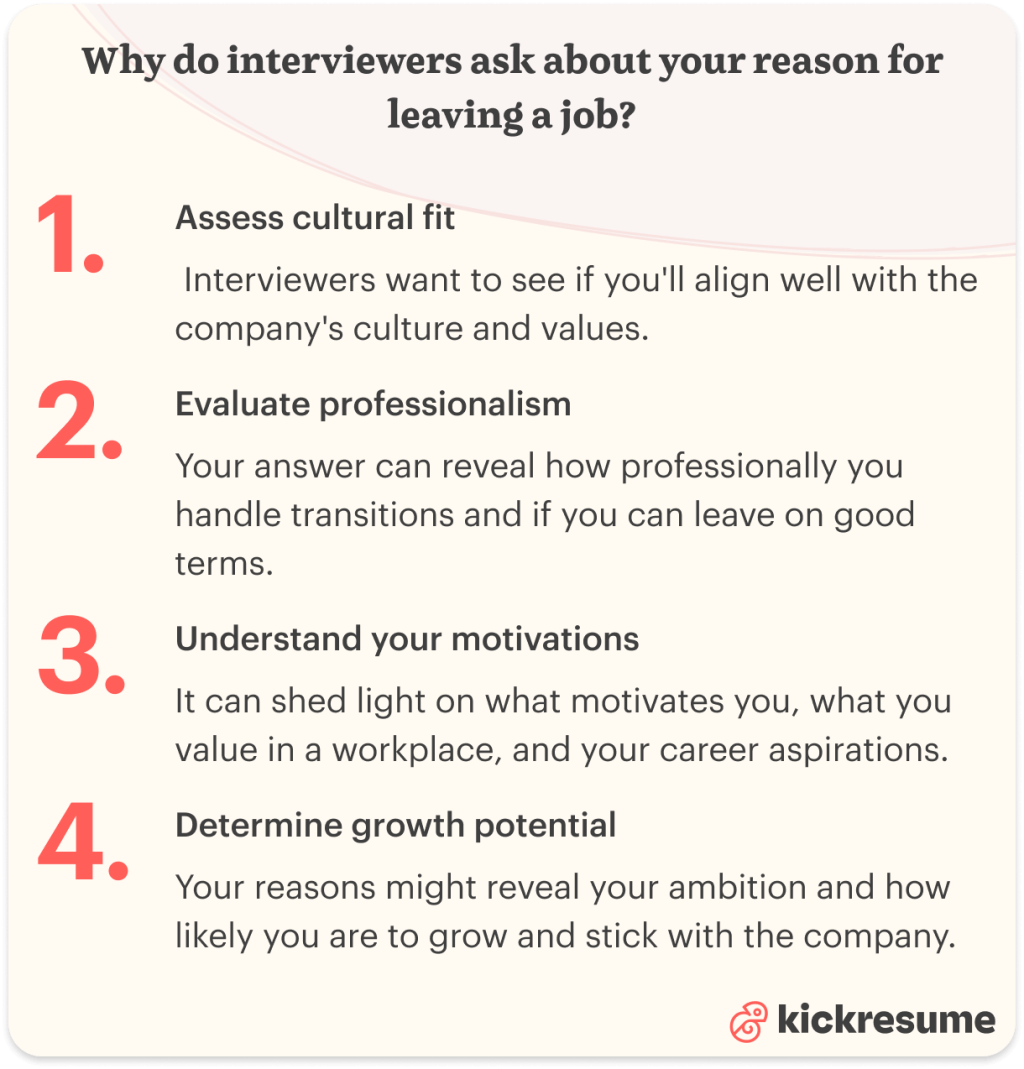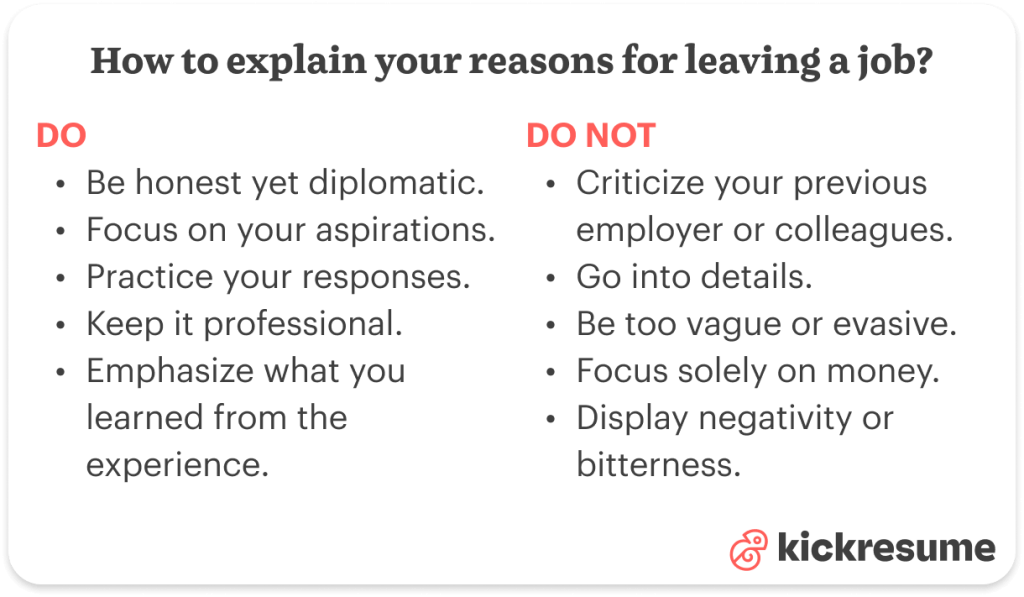


Have you ever been thrown off by the "What was your reason for leaving a job" in a job interview? It’s a question that might seem simple, but it often leaves even the most seasoned professionals feeling slightly uneasy.
However, your reason for leaving a job is more than just a routine part of the interview process.
It is, in fact, an opportunity for you to showcase your career growth, professional aspirations, and even your problem-solving skills. How you articulate this can have a significant impact on the interviewer’s perception of you as a potential candidate.
The job interview question is not just about understanding why you decided to move on from a past role. It is also a glimpse into your values, your relationship with past employers and colleagues, and your ability to handle change and adversity.
So, let’s peel back the layers of this question and help you prepare a response that is both authentic and strategically framed. After all, this could be your key to unlocking your next big career opportunity.
Click on a section to skip
Table of ContentsInterviewers ask about your reason for leaving a job for several key reasons. Understanding these can help you frame your response effectively.
It should go without saying that interviewers do not ask this question out of sheer curiosity. They ask it so they can make a more informed decision whether they should hire you or not.
Use our AI Resignation Letter Writer and quit your current job without making it awkward.
When they ask you about your reasons for leaving a job, interviewers will always read between the lines of your answer.
Just like with any other interview question, the way you explain your reasons for leaving a past job will impact the final outcome.
Remember, while honesty is vital, it’s also essential to frame your reasons positively, focusing on what you’ve learned or how you hope to grow in the future.

Job changes are a natural part of any career journey, and there are various valid reasons why someone might decide to leave their current position. Here are some common motivations, along with example answers that you could use in an interview:
Seeking a role with more responsibility or a faster path to advancement is a legitimate reason for seeking a new job.
Example answer: “I enjoyed my time at my previous company, but I felt like I’d reached a plateau in terms of growth opportunities. I’m now seeking a role where I can continue to develop my leadership skills.”
You might feel like you've learned all you can in your current role and are looking for new challenges.
Example answer: “I’m grateful for everything I learned at my previous job. However, I’ve been looking for a role where I can tackle new challenges and broaden my skill set, and I believe this job provides that opportunity.”
Leaving for a role with higher pay or better benefits is a practical reason many employees decide to move on.
Example answer: “While I valued the experience I gained at my last job, I’m now looking for a position that aligns more closely with my financial goals and provides a comprehensive benefits package.”
Many people leave roles in search of jobs that offer better work-life balance, such as flexible hours or remote work opportunities.
Example answer: “I loved the work I was doing in my last role, but I found it difficult to maintain a healthy work-life balance. I’m now looking for a position that offers more flexibility in terms of working hours and location.”
Major life changes, such as relocation, health issues, or family circumstances, often require a change in employment.
Example answer: “Due to some personal changes, I had to relocate, and commuting to my old job was no longer feasible. I’m excited about finding a new role closer to my new home.”
If your previous company was undergoing significant changes or there were concerns about job security, these are valid reasons for seeking a new role.
Example answer: “My previous company underwent a significant restructuring, which led to uncertainty about my role’s future. I decided it was a good time to seek out a more stable opportunity.”
Remember, when discussing your reason for leaving a job, honesty is essential.
While you should aim to frame your answer in a positive light, remember that potential employers value authenticity. Express your reasons truthfully and professionally to make a good impression.
Finally, if you feel like your job interview didn't go that well, you may want to look out for these signs you didn't get the job.

While honesty is key when explaining your reason for leaving a job, it's also crucial to frame your answer in a positive light, even if the circumstances of your departure were challenging.
Here are some strategies to help you present your reasons positively:
Rather than dwelling on any negative aspects of your previous job, direct the conversation towards your future aspirations. Discuss what you're looking for in your next role and how it aligns with your career goals.
Example answer: “While there were aspects of my last job that were challenging, I prefer to focus on what I’m seeking in my next role. I’m really excited about opportunities to work in a more collaborative environment, like the one your company has.”
No matter the circumstances, every work experience offers opportunities for learning and growth. Highlight what the experience taught you and how you've grown as a professional.
Example answer: “Although my previous job didn’t align perfectly with my career goals, I learned a great deal about [specific skill or area of knowledge]. I’m excited to bring those learnings to a new role.”
Even in a difficult situation, there are likely positive aspects you can draw attention to. Mention the skills you gained, the projects you enjoyed, or the relationships you built.
Example answer: “Despite facing some challenges in my previous role, I’m really proud of the work I did there, particularly [specific project or achievement]. I’m excited to tackle similar challenges here.”
If you had issues with your previous job, it's essential to be diplomatic in your response. Avoid blaming others or speaking negatively about your previous employer.
Example answer: “I had a different vision for my career path than what was available at my previous job. I respect the direction they’re heading, but I’m now seeking a role that aligns more closely with my career goals.”
By framing your reasons for leaving a job in a positive way, you can demonstrate resilience, professionalism, and forward-thinking—qualities that are sure to impress any potential employer.
Our AI Job Interview Questions Generator will help you prepare for the most common interview questions for your profession.
As important as it is to know how to answer the question, it's equally crucial to understand what to avoid. Certain responses can potentially harm your chances of securing the job. Here are a few pitfalls to steer clear of:
While it's important to be honest, avoid openly criticizing your previous employer (there are ways to deal with a difficult boss, after all) or colleagues. It can give the impression that you're difficult to work with.
Inappropriate example: “My boss was terrible and didn’t know how to manage the team.”
While it's okay to mention personal reasons for leaving a job, you should avoid delving into too much detail. Keep your answer professional.
Inappropriate example: “There was too much drama in my personal life, and I couldn’t handle the stress.”
Giving vague or non-committal answers can raise red flags for interviewers. It's better to be clear and concise with your reasons.
Inappropriate example: “It just wasn’t working out for me there.”
While compensation is a legitimate reason to change jobs, it's best not to present it as the only reason. It could give the impression that you're only interested in money and not the role itself or the company's values.
Also, if you think this could be a good way to start salary negotiation, it really is not. There are better ways to deal with that.
Inappropriate example: “I’m just looking for a place that will pay me what I’m worth.”
Remember, the key to discussing your reason for leaving a job is to stay positive, professional, and focused on the future. By avoiding these pitfalls, you'll make a stronger impression and increase your chances of landing the job.

Preparation is crucial when it comes to tackling the “reason for leaving a job” question effectively. By practicing your response, you can ensure that you come across as confident, genuine, and composed during your interview.
Here’s why rehearsing your answer is so important and some strategies to help you do it effectively:
Practice makes perfect and job interviews are no exception. Somewhat paradoxically, it can even help you appear more genuine and persuasive.
Truly effective practice takes technique and strategy. Here are several techniques that can help you answer the “reason for leaving a job” question under any circumstances:
Remember, your goal isn’t to memorize a script but to become comfortable discussing your reason for leaving a job in a way that reflects positively on you as a professional. The more comfortable you are with your answer, the more genuine and composed you’ll come across during your interview.
Are you looking for more ways to prepare for your job interview? Here's an interview with a real recruiter who can help you with that.
Remember that every professional has their unique reasons for job changes, and it's perfectly normal. The key is to present your reasons professionally, honestly, and positively, keeping in mind the future you aspire to rather than dwelling on the past.
So, as you prepare for your upcoming interviews, take some time to reflect on your reasons for leaving your previous job. Frame them in a way that highlights your learnings, your career aspirations, and the value you bring to a new role. And most importantly, practice your response to feel confident and genuine when the question arises.
Best of luck on your job-seeking journey! And remember — every job interview, regardless of the outcome, is a step forward in your professional development. Keep learning, keep growing, and you'll find the right fit for you. (Oh, and don't forget to send a thank you note after the interview!)